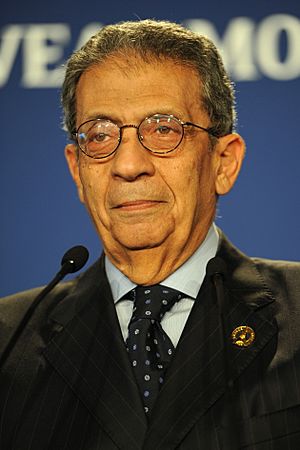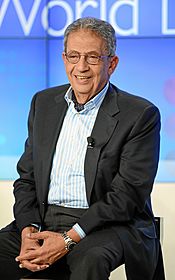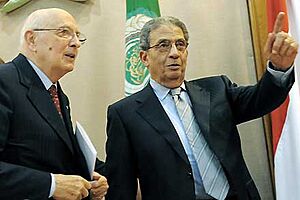Amr Moussa facts for kids
Quick facts for kids
Amr Moussa
ON
ORE |
|
|---|---|
|
عمرو موسى
|
|

Moussa in 2011
|
|
| 6th Secretary-General of the Arab League | |
| In office 1 June 2001 – 1 July 2011 |
|
| Preceded by | Ahmed Abdel-Meguid |
| Succeeded by | Nabil Elaraby |
| Minister of Foreign Affairs | |
| In office 20 May 1991 – 15 May 2001 |
|
| Prime Minister | Atef Sedki Kamal Ganzouri Atef Ebeid |
| Preceded by | Ahmed Asmat Abdel-Meguid |
| Succeeded by | Ahmed Maher |
| Egyptian Ambassador to the United Nations | |
| In office 1 January 1990 – 20 May 1991 |
|
| President | Hosni Mubarak |
| Preceded by | Ahmed Aboul Gheit |
| Succeeded by | Nabil Elaraby |
| Personal details | |
| Born |
Amr Mouhammed Moussa Abu-Zeid
3 October 1936 Cairo, Egypt |
| Political party | Congress Party |
| Spouse | Leila Moussa |
| Children |
|
| Alma mater | Cairo University |
Amr Moussa (born October 3, 1936) is an important Egyptian politician and diplomat. He served as the Secretary-General of the Arab League from 2001 to 2011. The Arab League is a group of 22 Arab states that work together.
Before this, he was Egypt's Minister of Foreign Affairs from 1991 to 2001. In 2013, he was chosen to lead a group that helped change the Egyptian constitution.
Contents
Early Life and Education
Amr Moussa was born in Cairo, Egypt, on October 3, 1936. His father, Muhammad Moussa, was a member of parliament.
Amr Moussa studied law at Cairo University. He earned his degree in 1957.
A Career in Diplomacy
Amr Moussa began his diplomatic career in 1958. For many years, he worked in different Egyptian missions around the world. These included the Egyptian Embassy in Switzerland and the Egyptian mission to the United Nations.
From 1974 to 1977, he was an advisor to the Minister of Foreign Affairs. He also led the Department of International Organizations at the Ministry of Foreign Affairs for several years.
Representing Egypt Abroad
Moussa was the Deputy Permanent Representative to the United Nations in New York from 1981 to 1983. He then became the Ambassador to India from 1983 to 1986. In 1990, he was promoted to be Egypt's Permanent Representative to the United Nations.
On May 20, 1991, he became Egypt's Minister of Foreign Affairs. He held this important role until May 15, 2001.
Key Diplomatic Efforts
Amr Moussa has been deeply involved in Egypt's foreign policy since 1958. He served as Egypt's ambassador to the United Nations, India, and Switzerland for a total of 21 years. He also worked with other diplomats to try and resolve the Lebanese Civil War (1975–1990).
Moussa became very popular in Egypt because he often spoke out against certain policies. For example, he criticized policies towards Gaza and the West Bank. He also spoke about the need for fair nuclear energy policies for all countries.
Leading the Arab League
On May 15, 2001, Amr Moussa was chosen to be the Secretary-General of the League of Arab States. He officially started this role on June 1, 2001.
In 2003, he joined a special United Nations group. This group looked at threats and challenges to international peace and security. In 2009, he signed an agreement with the Holy See (the Vatican). This agreement aimed to promote peace and dialogue between cultures and countries.
Visiting Gaza
On June 13, 2010, Moussa visited Gaza. This visit was meant to put pressure on Israel to lift its economic blockade on Gaza. It was the first visit by an Arab League official since 2007. After an event known as the Gaza flotilla raid, Moussa said the Arab League would ask the UN Security Council to demand the blockade be lifted.
His term as Secretary-General ended on July 1, 2011. Nabil Elaraby took over the position.
Presidential Candidacy
Amr Moussa was considered a possible candidate for president of Egypt several times.

The 2005 Election
In 2004, many people online signed petitions asking Moussa to run in the 2005 Egyptian presidential election. However, he did not run at that time.
The 2012 Election

In October 2009, when asked about running for president in 2012, Moussa did not say no. He stated that any citizen with the right skills should be able to seek political office. He also met with Mohamed El-Baradei to discuss changes to the constitution. These changes would make elections more open and fair.
On February 1, 2011, after President Hosni Mubarak announced he would not run again, Moussa said he would seriously consider running. On March 1, 2011, Amr Moussa officially announced his plan to run for president.

During protests in 2011, a poll asked who should be the next president. Moussa was in the lead, with 26% of people choosing him. In the actual 2012 Egyptian presidential election, he finished fifth. After the election, he helped form the Conference Party.
Criticisms and Honours
Some people who worked with the Arab League criticized Moussa's management style. They said he sometimes favored certain staff members.
Egyptian Honours
Amr Moussa has received high honours from Egypt. These include:
- Grand Cordon of the Order of the Nile
- Grand Cordon of the Order of the Arab Republic of Egypt
International Honours
He has also received honours from other countries, such as:
- Grand Cross of the Order of the Liberator General San Martín (Argentina)
- Grand Cross of the Order of the Southern Cross (Brazil)
- Commander of the Legion of Honour (France)
- Grand Cross of the Order of Merit of the Federal Republic of Germany (Germany)
- Grand Cordon of the Order of the Rising Sun (Japan)
- Grand Cordon of the Supreme Order of the Renaissance (Jordan)
- Grand Cordon of the Order of the Star of Palestine (Palestine)
- Medal of the Order of Friendship (Russia)
Honorary Degrees
Amr Moussa has also received honorary degrees from universities like ADA University and the American University of Beirut.
See also
 In Spanish: Amr Musa para niños
In Spanish: Amr Musa para niños
 | Sharif Bey |
 | Hale Woodruff |
 | Richmond Barthé |
 | Purvis Young |


